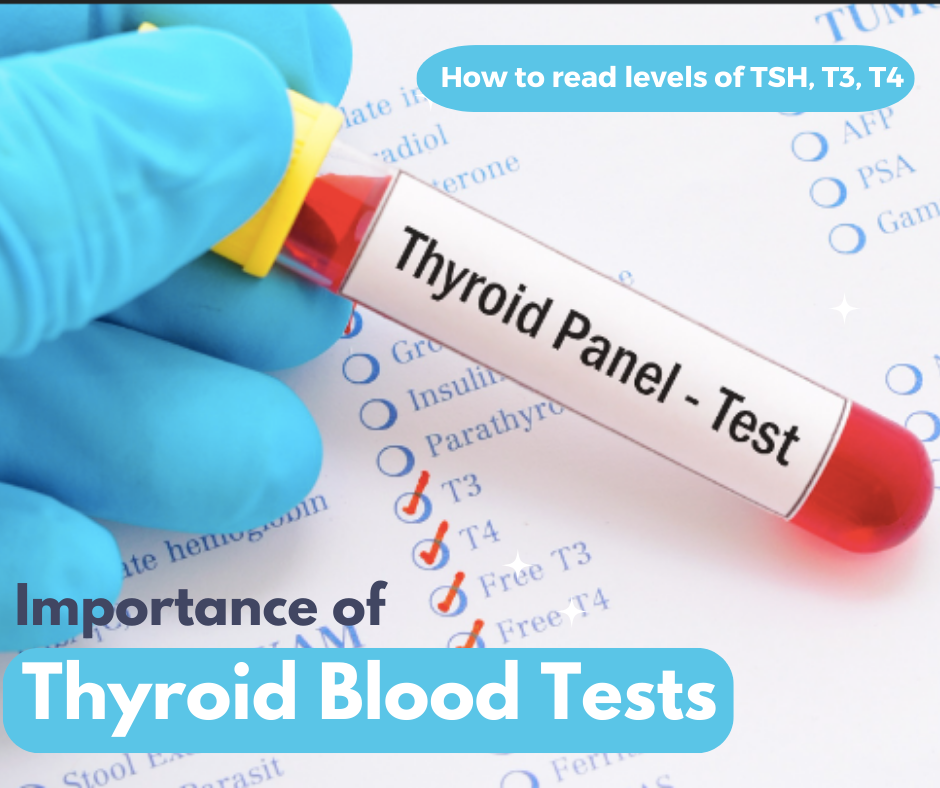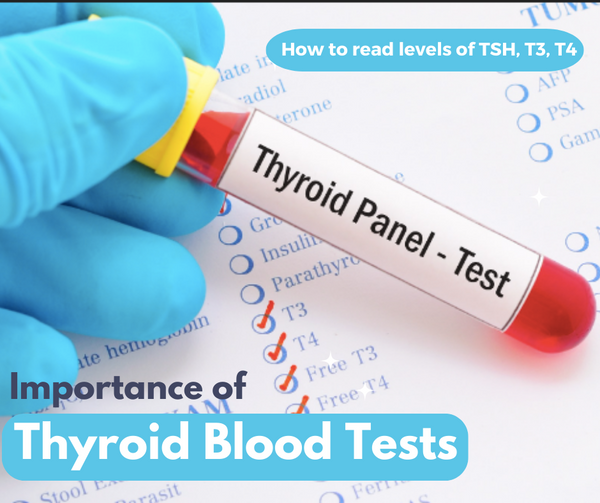
Importance of Thyroid Blood Tests
Share

The thyroid is a small gland located in the lower-front part of your neck which constantly releases a certain amount of hormones into the blood which is responsible for helping regulate many bodily processes, such as metabolism, energy generation, and mood.
The thyroid produces two major hormones: triiodothyronine (T3) and thyroxine (T4). If your thyroid gland doesn’t produce enough of these hormones, you may experience symptoms such as weight gain, lack of energy, and depression. This condition is called hypothyroidism.
If your thyroid gland produces too many hormones, you may experience weight loss, high levels of anxiety, tremors, and a sense of being on a “high.” This is called hyperthyroidism.
Typically, a doctor who is concerned about your thyroid hormone levels will order broad screening tests, such as the T4 or the thyroid-stimulating hormone (TSH) test. The constant hormonal release into the blood by thyroid gland helps in determining the amounts of hormones produced by the thyroid gland through blood test. The blood test measures the levels of TSH and the thyroid hormones triiodothyronine (T3) and thyroxine (T4).
When a doctor suspects a thyroid disorder, they may recommend several tests to assess thyroid function. These commonly include:
1. Thyroid Stimulating Hormone (TSH) Test: A change in the TSH level can be an early sign of a thyroid problem. For this reason, it is common to only measure the TSH level at first. If those results come back abnormal, your doctor will order further tests to pinpoint the reason for the problem.
2. Thyroid Hormone Tests (T3 and T4): These tests measure the levels of thyroid hormones T3 (triiodothyronine) and T4 (thyroxine) in the blood. Total T3 and T4 tests measure both bound and unbound forms of these hormones, while free T3 (FT3) and free T4 (FT4) tests measure only the unbound, active forms.
here's a table outlining the typical levels of thyroid hormones for normal, hypothyroidism, and hyperthyroidism:
| Thyroid Hormone | Normal Level | Hypothyroidism Level | Hyperthyroidism Level |
|---|---|---|---|
| TSH (Thyroid Stimulating Hormone) | 0.4 - 4.0 mIU/L | Elevated (>4.0 mIU/L) | Decreased (<0.4 mIU/L) |
| T4 (Thyroxine) | 4.5 - 11.2 µg/dL | Decreased (<4.5 µg/dL) | Increased (>11.2 µg/dL) |
| T3 (Triiodothyronine) | 80 - 200 ng/dL | Decreased (<80 ng/dL) | Increased (>200 ng/dL) |
3.Thyroid Antibody Tests: These tests, including thyroid peroxidase antibody (TPOAb) and thyroglobulin antibody (TgAb) tests, detect antibodies that target the thyroid gland. Elevated levels of these antibodies may indicate autoimmune thyroid disorders such as Hashimoto's thyroiditis or Graves' disease.
4. Thyroid Ultrasound: This imaging test uses sound waves to create images of the thyroid gland. It can help assess the size, structure, and abnormalities of the thyroid gland, such as nodules or enlargement.
5.Radioactive Iodine Uptake (RAIU) Test: This test measures the amount of radioactive iodine taken up by the thyroid gland. It helps evaluate thyroid function and can differentiate between different types of thyroid disorders, such as hyperthyroidism and hypothyroidism.
6.Thyroid Fine Needle Aspiration (FNA) Biopsy: If thyroid nodules are detected on ultrasound, a biopsy may be performed to collect tissue samples for examination under a microscope. This helps determine if the nodules are benign or cancerous.
Accurate interpretation of these blood test levels through above different tests is crucial in diagnosing thyroid disorders and guiding appropriate treatment. Physicians analyze these levels in conjunction with patient symptoms and other clinical factors to determine the underlying cause of thyroid dysfunction and develop tailored treatment plans, which may include medication, dietary changes, or other interventions to restore thyroid hormone balance and improve overall health. Regular monitoring of thyroid function through blood tests helps in evaluating treatment effectiveness and adjusting therapies as needed.
Conclusion
The thyroid plays a vital role in regulating various bodily processes such as metabolism, energy production, and mood. When the thyroid gland becomes dysfunctional, it can lead to conditions like hypothyroidism or hyperthyroidism, each characterized by distinct symptoms. Doctors utilize a range of tests, including thyroid hormone tests (TSH, T3, T4), thyroid antibody tests, ultrasound, radioactive iodine uptake tests, and fine needle aspiration biopsy, to accurately diagnose thyroid disorders. Interpreting blood test results, particularly levels of TSH, T3, and T4, alongside clinical symptoms, is essential in guiding treatment decisions. By closely monitoring thyroid function and adjusting therapies as necessary, healthcare professionals can effectively manage thyroid disorders and optimize patient health and well-being. Regular follow-up and comprehensive care ensure ongoing management and support for individuals with thyroid conditions.
